Shaking the Gates of Hell – By John Archibald
April 14, 2021
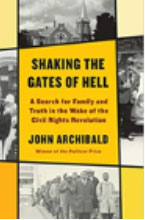
John Archibald is a Pulitzer-prize winning columnist for the Birmingham News. His success is such that he has been invited to attend The Kennedy School at Harvard – a far cry from his days as a journalism student at the University of Alabama.
When I worked in Birmingham, John covered City Hall for the News, which meant that he always had a new story, normally several. John and I used to have lunch at a Greek seafood place called The Fish Market, where he tried to educate me about the South, about southern politics, and most-importantly, about race.
John has just published his first book, a memoir about his family and growing up in the South. Like many moderate white southerners, John has thought deeply about and questioned the role his parents played as the Civil and Gay Rights Movements came to play major roles in American life.
John’s father, like many in his family before him, was a Methodist minister. The subjects of each chapter are taken from his sermons. John’s book could be written my many other white southerners if they only shared his skill with words. Heiress Diane McWhorter’s Carry Me Home is another example. How could a church that professes to follow the teachings of Jesus fail to embrace civil and gay rights?
It wouldn’t surprise me if John’s book wins him another Pulitzer. I couldn’t put it down. Thanks, John, for teaching me what you did while I worked in Birmingham and, now, for the opportunity to learn more from reading your book.
The Guns of August – By Barbara Tuchman
April 13, 2021
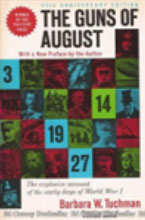
I first read this book when it came out in 1962. I was fresh out of college where I had studied the causes of the First World War. In a word, they were “complicated.” And then this book came along and cleared everything up for me. I was looking for it in my library a few weeks ago and noticed that it was missing. I must have loaned my copy to someone many years ago. I reordered it and read it again with all the pleasure I experience the first time around.
Ms. Tuchman was not a trained historian and did not have a PhD in the subject but her book won the Pulitzer for non-fiction in 1962. Reading it almost 60 years later, I was still blown away. It remains one of the finest books of history written in the 20th century. Her amazing grasp of both the micro and macro elements of the lead-up to and then cover the first month of the war. Highly recommended for generations of new readers.
The Man Who Ran Washington: The Life and Times of James A. Baker III – By Peter Baker and Susan Glaser
April 13, 2021
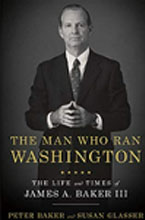
A couple of days ago I saw James Baker being interviewed on television and commenting on the politics of the day. He still has it. The Washington Post reviewer said of this book: “The Man Who Ran Washington . . . will rank alongside it as among the very best books about American political life in the late 20th century.” I can’t add very much to that. This is an immensely personal account about the bigger-than-life Texan who served Republican presidents from Reagan to George Bush, but really served us all. The history is here but so are the personal ambitions, the competitive drive of a man who could have, and some say should have, become President of the United States. This is one of the best books of political history I’ve read in the past ten years and I highly recommend it.
Julie Butler Hansen: A Trailblazing Washington Politician – By John C. Hughes
March 3, 2021

This is the latest in the series of outstanding biographies of Washington state leaders by John C. Hughes. They have all been good, but in my opinion, this is one of his best works to date. Hughes is the chief historian for the Office of the Secretary of State. He retired as editor and publisher of The Daily World in Aberdeen in 2008 after a 42-year career in journalism that saw him win awards for reporting, photography, historical features, editorials and columns. An alumnus of the University of Puget Sound and the University of Maryland, he is a trustee of the Washington State Historical Society.
Hughes is the author of 11 books on Northwest history, including On the Harbor: From Black Friday to Nirvana; Booth Who?, a biography of Governor Booth Gardner; Slade Gorton, A Half Century in Politics; Lillian Walker, Washington State Civil Rights Pioneer; Governor John Spellman: Politics Never Broke His Heart; Pressing On, the story of the family-owned Seattle Times and Wenatchee World. His latest books are Un-sold, a biography of former congresswoman Jolene Unsoeld; Washington Remembers, a collection of profiles of World War II veterans; The Forgotten War Remembered, Korea 65, and 1968: The Year that Rocked Washington.
It’s pretty clear that Hughes has a personal affinity for his subject. It’s not surprising. She was his congresswoman and I’m sure that, over the years the two shared a drink or two and many good stories. Hansen, (1907-1988) belonged to that generation of powerhouse Washington politicians that included Warren Magnuson, Henry (Scoop) Jackson, and Dan Evans. She was a 20-member of Congress and a powerhouse sub-chairman of the House Appropriations Committee after serving 20 years in the Washington legislature, rising to Speaker Pro Tempore.
While in Congress, she chaired a 1973 committee that de facto overhauled the rules of the House of Representatives. Breaking other glass ceilings, Hansen was nationally active in highway policy groups and in her later years was chair of the Washington State transportation commission. During her early years, Hansen authored a published book and aspired to become a journalist. After being elected to her hometown council at Cathlamet, Washington, Hansen was caught up into Democratic politics, becoming a Capitol Hill favorite of Presidents John Kennedy and Lyndon Johnson. During an era when women faced historic and well-known odds, she won 42 consecutive elections. I couldn’t put it down.
A Promised Land: By Barack Obama
February 23, 2021
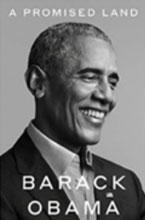
Your view of this book will be defined by your view of the author in this highly polarized society. I happen to be an Obama supporter, and so I read this first of two books about the Obama presidency with interest as a means of finding out more about the behinds-the-scenes decisions and motivations that led to the major decisions of his presidency. While there are many passages of self-revelation, I must say, I was a little disappointed in the book overall.
Don’t get me wrong. The book is GOOD. He writes just like he talks, and his stories of being a community organizer and running for the presidency are compelling and interesting . . .all the more so for having lived through them. Still, I think I expected more and I came away having enjoyed the book, but not as much as I expected to. However, this is still a “must read” for those interested in the American presidency and politics and the early 21st Century.
Greyhound: By C.S. Forester
February 20, 2021

Though promoted as ‘Greyhound’ on account of the film title, this is in fact Forester’s ‘The Good Shepherd’ – a title actually a lot more descriptive of the tenor of the novel.
Although I was a devoted reader of Forester’s Hornblower novels in my teens and read most of his other books, including The Gun, Rifleman Dodd and The African Queen when they came out in movies, I somehow missed The Good Shepherd. When I saw that the Greyhound movie had come out, I watched it and then bought and read the book. I don’t believe I have ever read a book of fiction that kept me so riveted as this one. Forester was good at writing Napoleonic naval history, but even better at writing about WWII with which he was much more familiar, having served as a part of the secret British mission led by William Stevenson (Intrepid) to help generate American support for Great Britain during the war.
Mussolini’s War: Fascist Italy from Triumph to Collapse: 1935-1943 By John Gooch
January 20, 2021
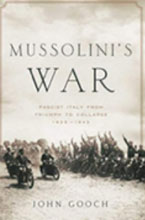
An interesting new book about the Mussolini and Italian military in World War Two, outlining the brief rise and triumph of the Fascists, followed by the disastrous fall of the Italian military campaign. I was particularly interested in reading this book because I have recently written about the presence and work of the Italian prisoners at Big Pasco during the war. This book goes a long way toward explaining why they were there!
While staying closely aligned with Hitler, Mussolini remained carefully neutral until the summer of 1940. At that moment, with the wholly unexpected and sudden collapse of the French and British armies, Mussolini declared war on the Allies in the hope of making territorial gains in southern France and Africa. This decision proved a horrifying miscalculation, dooming Italy to its own prolonged and unwinnable war, immense casualties, and an Allied invasion in 1943.
The Rise of the G.I. Army, 1940-1941: The Forgotten Story of How America Forged a Powerful Army Before Pearl Harbor
By: Paul Dickson
January 10, 2021
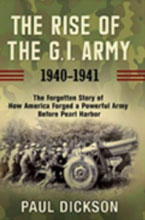
The sub-title describes this book. In the years since, I have read a lot about successful U.S. military action from North Africa to the South Pacific. Some of the best books, like Rick Atkinson’s trilogy on U.S. forces in Europe, are reported through the eyes of all the troops, from privates to generals. Insightful as they are, they are woefully incomplete without knowledge of the achievements of 1940 and 1941. Under the masterful leadership of General George C. Marshall, Army Chief of Staff, he and a capable team set out to resurrect a depleted and weakened army, deemed incapable of defending our shores from the invasions then expected from the Atlantic and Pacific.
By the attack on Pearl Harbor, Marshall and his team (including Henry Stimpson, Secretary of War, and Generals Omar Bradley, Walter Krueger, Lesley J. McNair, and George S. Patton) had built a multi-million fighting force, two thirds recruited from the draft and a third volunteers.
Dixon explores the headwinds against this mobilization from sources as varied as anti-war college students, isolationist America Firsters, and the pro-German Charles Lindbergh. He traces the surprising role of the Civilian Conservation Corps (CCC) as a quick source of fit and disciplined recruits. And he tracks the equally surprising public support for the draft, prized for its community roots and fairness in equal treatment for all, from Rockefellers and Roosevelts to the Smiths and Joneses.
Dickson provides us with a valuable service by telling us the story behind the story. I thoroughly enjoyed this and book and learned a lot from it.
The Year 1000: When Explorers Connected the World―and Globalization Began
By: Valerie Hansen
September 1, 2020
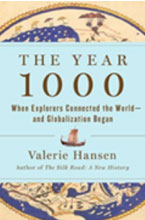
Readers of this book are in for a real treat. I read this about the same time as I read Empire: A New History of the World and the two books complement each other. A fascinating synthesis of archaeology, anthropology and historical analysis the scholarship underlying the well-researched and highly readable text is supported by detailed notes and bibliography. The book will challenge and stimulate you in equal parts as a truly global perspective is laid out showing the trading links and cultural exchanges existing and thriving in the year 10000. From the Viking settlements in North America and the trade routes reaching down to the Mayan empire, the well-established routes across Sub Saharan Africa to the Middle East, Slavic and Rus trade across Eastern Europe to Constantinople and Baghdad, the Silk Road between China and Europe by land, and the extraordinary maritime trade routes between Polynesia, Indonesia, the Arabic world and Africa. A thoroughly thought provoking and highly recommended study. Four Stars!
Empire: A New History of the World
By: Paul Strathern
September 1, 2020

Empire is one of these books that surveys all of history to date in a brief manner to give the reader a taste of what took place in the hopes that it would entice you to want to delve more deeply into the details. In the case of this book, the subject is covered in about 230 pages of text with a few illustrations thrown in. Over these relatively few pages, ten different “empires” are described: The Akkadians, Romans, Umayyad and Abbasids, Mongol, Yuan (Chinese) Aztec, Ottoman, British, Russian, and American. Averaging 25 pages each, of course there is no deep exposition of any of them. Instead, what we have is a brief description of who they were, or are; what brought them to the fore; and what caused their downfall. This, along with plentiful names and dates can serve as a launching pad for the interested reader to finding more information about any of these specific empires. This book is a very interesting “background” book and one that I have kept in my library for future reference.
Countdown 1945: The Extraordinary Story of the Atomic Bomb and the 116 Days That Changed the World
By: Chris Wallace
August 23, 2020

I enjoyed reading Wallace’s book much more than I do watching him on TV. His day-by-day account of the decisions and activities leading up to the dropping of the atomic bomb held my attention from the minute I opened it until I finished reading it. Wallace wrote with Mitch Weiss, (an investigative reporter for the A. P.), as his co-author and it is a brilliant pairing. The editing and publishing is also top notch.
The book is written from a 3rd person POV and begins by introducing the key players involved in the 116 days that lead up to the bombing of Hiroshima and Nagasaki: President Truman, key members of the Manhattan Project, a 10 year old survivor from Hiroshima and a woman who worked at a plant that supported the effort. These civilians are real and some are still living today. Their stories are authentic and compelling and bring the history to life, giving it a rare and unusual richness.
The Apocalypse Factory: Plutonium and the Making of the Atomic Age
By: Steve Olson
August 15, 2020

Steve Olson’s new book on the history of Hanford and the Manhattan Project is, in many ways, similar to Bob Ferguson’s and my short history, Something Extraordinary. He came to Richland for the release of our book. Steve is a native of Othello and still lives in Washington State. He was a runner-up for the National Book Award for his excellent book, Eruption, about the eruption of Mt. Saint Helens. His book contains more detail and more science than ours. The reader sees how the discovery of plutonium extraction, that can eventually become a nuclear weapon, quickly went from scientific experimentation to creating a town in a barren section in eastern Washington state for the sole purpose of developing and creating the components that become a nuclear bomb. Olson covers the dropping of those initial bombs in Japan, particularly the one in Nagasaki, and its after effects on the Japanese population not just from a health perspective, but looking at economic and diplomatic effects as well. As the book continues past World War II, the nuclear arms race becomes a political hot button and Olson considers all sides in the diplomatic negotiations that continue well into the 1980’s and are still happening today. A welcome addition to your Hanford library.
The Red and the Blue: The 1990s and the Birth of Political Tribalism
By: Steve Kornacki
June 24, 2020
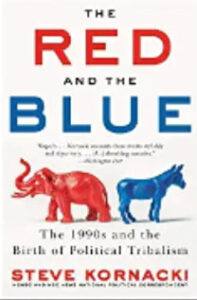
This is an excellent work which focuses on the political changes of the 1990s and how they helped set the tone for our current toxic politics. In that decade, a number of politicians saw new opportunities to take the low road in politics as a way of advancing their careers. Political behavior often appeared substantially more brutal and cutthroat as veneers of comity slipped away. Additionally, conspiracy theories, unsupported by serious evidence, became stunningly popular, especially when advanced by conservative “talk” radio. Such radio programs were widely treated as gospel by the right and viewed as the ravings of a bunch of kooks by the left. I recognize that historians can point to many other instances of highly partisan politics dating back to the Jefferson-Adams presidential campaign, but in the 1990s we saw a substantial uptick in the blending of toxic partisanship with the technology of mass communications available to almost everyone. This is of course a continuing trend.
A number of important personalities are discussed in the book including individuals such as President Bill Clinton, Hillary Clinton, Newt Gingrich, Mario Cuomo, Jesse Jackson, Pat Buchanan, and others. I taught college level American government in the 1990s, and thought Kornacki did a particularly good job in capturing the often visceral Republican hatred of Bill Clinton at the time, and their frequent willingness to believe virtually anything bad about him from any source. I have also written about this in my book, Congressman Doc Hastings: Twenty Years of Turmoil. I strongly recommend this book.
The King’s War: By Peter Conradi and Mark Logue
March 19, 2020
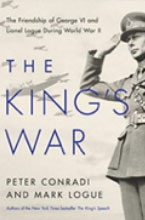
If you enjoyed the bestselling book and award-winning film, The King’s Speech, this book is for you. The King’s War was an eagerly anticipated sequel deals with King George VI and his confidant and speech therapist Lionel Logue during the darkest days of World War II.
The broadcast that George VI made to the British nation on the outbreak of war in September 1939—which formed the climax of the multi-Oscar-winning film The King’s Speech—was the product of years of hard work with Lionel Logue, his iconoclastic, Australian-born speech therapist. Yet the relationship between the two men did not end there. Far from it: in the years that followed, Logue was to play an even more important role at the monarch’s side.
The King’s War follows that relationship through the dangerous days of Dunkirk and the drama of D-Day to eventual victory in 1945—and beyond. Like the first book, it is written by Peter Conradi, a London Sunday Times journalist, and Mark Logue (Lionel’s grandson), and again draws on exclusive material from the Logue Archive—the collection of diaries, letters, and other documents left by Lionel and his feisty wife, Myrtle. This gripping narrative provides a fascinating portrait of two men and their respective families—the Windsors and the Logues—as they together face the greatest challenge in Britain’s history.
PRINCE ALBERT: The Man Who Saved the Monarchy By A. N. Wilson
March 1, 2020
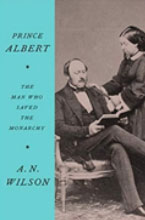
We tend to focus on Queen Victoria because of the length of her reign and the fact that it coincided with the glory years of the British Empire. Prince Albert is often relegated to the old saw of my youth, “Do you have Prince Albert in the can?”
A. N. Wilson’s detailed biography paints an altogether different picture of an educated, man of the arts; intelligent, liberal (for his time) man who sought to use his marriage to usher in a new era of liberal monarchs throughout Europe. In this he failed, but there was so much in which he succeeded. An able administrator, he was in many ways the strength behind the throne; so much so that the politicians of the day feared his political skills.
Albert and the young Victoria lived during an important time. The beginnings of the industrial revolution and its resulting changes to society including the change of the average Englishman from agricultural tenant farmer to factory worker. The unification of Italy as a nation and the start of German unification. The lead-up to the American Civil War. The Sepoy rebellion in India.
In spite of conceiving nine children, Albert and Victoria had a complicated relationship; he, perhaps more than anyone, controlling her intense mood swings. Nelson relies on his extensive research into the private correspondence of the family to paint an intimate and revealing picture. One of the best biographies I have read recently.
In this companion biography to the acclaimed Victoria, A. N. Wilson offers a deeply textured and ambitious portrait of Prince Albert, published to coincide with the 200th anniversary of the royal consort’s birth.
Why We’re Polarized: By Ezra Klein
February 1, 2020

THIS IS A REALLY IMPORTANT BOOK!
Ezra Klein is the editor-at-large and cofounder of Vox, the award-winning explanatory news organization. Prior to that, he was a columnist and editor at The Washington Post, a policy analyst at MSNBC, and a contributor to Bloomberg.
There is no question that we have become more polarized. Some of the reasons are not hard to understand. . .talk radio, the 24-hour news cycle, and cable TV. Klein argues that we’ve always self-segregated by race, religion, class, education urban/rural and countless other things.
The problem comes when these identities start merging into “mega identities.” It’s happening now as conservatives, religious, older-white, and rural identities all align and merge into a single mega identity which then sees itself in opposition to another mega identity: the left, secular, multi-ethnic and urban. That’s the key finding about why we’re in trouble, but there’s much more to it.
Klein suggests that today’s polarization has its roots in the 1960s, but it leaves out what the right-wing sees as the most polarizing events, such as the fight over school busing, the massive urban riots, the counter-culture, black power, and anti-war bombings. I’ve written about these factors in several of my books.
Klein notes that political parties have been getting weaker since the early 1970s, while partisan fervor has gotten stronger, because primaries, with their low turnout, favor the partisan extremes. This brings us to today and Trump’s takeover of the Republican Party.
Fascism: A Warning By Madeleine Albright
October 10, 2019

A new book by former Secretary of State Madeleine Albright describes how nations become authoritarian states from her own personal experiences and as a student of history and geo-politics. Everyone concerned about the future of our own democracy should read this book! Many of the conditions that led to authoritarian dictatorships in other countries exist in the United States today.
The news envelops us like a flood tide, so much that it is difficult to make sense of all of it. This book helps us better understand the present through the study of the past. Highly recommended!
The Soul of America: The Battle for our Better Angels. By Jon Meacham
October 5, 2019

BOOK FOR OUR TIMES!
If we don’t study and understand the lessons of history, we are bound to repeat them. Presidential historian Jon Meacham, one of the best historians and writers of our time, explores previous contentious periods and how presidents and citizens came together to defeat fear, anger, intolerance and extremism. He writes about the Civil War, reconstruction, the Klan, anti-immigrant policies, and the Red Scares after WWI and the 1950s.
Madeleine Albright, in her new book on fascism, exhorts people not only to say something if they see something, but to DO something. Meacham provides a list of what to do:
– Get involved
– Resist tribalism
– Respect facts and employ reason
– Find a critical balance, and
– Keep history in mind.
The British Are Coming: The War for America, Lexington to Princeton, 1775-1777. By Rick Atkinson
July 27, 2019
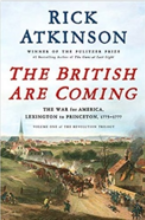
This is the first volume of Pulitzer Prize-winning journalist and author Rick Atkinson’s long-awaited trilogy of the American Revolutionary War. Atkinson’s three-volume history of the US Army in North Africa, Italy, and Western Europe were among the best works of military history I have ever read.
Atkinson’s first volume of his new trilogy does not disappoint. Writing about men and events in the eighteenth century is different from writing about men and events in the 1940s. One needs to rely much more on the written memoranda, letters, and other accounts of the participants, and the language of the time makes their comments seem more distant. For all that, the events they convey seem immensely real and vivid. One indication of Atkinson’s meticulous research is that there 168 pages of notes in 6-point type and another 43 pages of source notes in this 750-page book.
The book is full of detailed accounts of the events leading up to Concord and Lexington. The major figures come alive with detailed descriptions of their appearance, motivations, and actions.
Much has been written about our founding fathers, but relatively little military history has been written about the War for Independence. I look forward to the next installment.
One Bullet Away: The Making of a Marine Corps Officer by: Nathanial Fick
July 27, 2019

I bought this book because it was listed on General Jim Mattis’ list of thirty best books. I have now read most of them and await Mattis’ own new book, Call Sign Chaos: Learning to Lead, just released. The book sat on my shelf for nearly a year because I was writing my latest book, the title didn’t excite me, and I had plenty of other books to read. I should have known better. Every other Mattis recommended book has been an insightful and informative read, and One Bullet Away is no exception.
The book is an autobiography of the author’s journey through various training schools on his way to becoming a lieutenant in a Marine Corps Recon battalion. His descriptions of what encountered were enlightening, to say the least, and explain a lot about why the Marine Corps is different than any of our other fighting forces. Fick’s learning experience may not have been that much different than Mattis’ as described in his new book.
But the purpose of the Corps is to fight, and Fick’s recon company was deployed first to Afghanistan and then to Iraq when the US-led coalition toppled Saddam Hussein. Fick’s personal description of combat, his conflicted viewpoints between his personal values and what he needed to do as a Marine Corps officer, and retrospective views of his service make this book a “must read” for anyone joining the service. Highly recommended.
The Forgotten Man: A New History of the Great Depression By Amity Shlaes
June 12, 2019

I’ve been reading a lot of books about the Great Depression and the years leading up to World War II recently. I’ve read plenty about Roosevelt and the New Deal, but less about how his policies and the wave of various political ideologies—communism, fascism, and isolationism resulting from the chaos of the First World War—influenced the times.
The book traces the successes and failures of Franklin Roosevelt’s attempts to remake the American economy, including the saga of the Tennessee Valley Authority which was the model for the unsuccessful Columbia Valley Authority which was killed by a Republican congress after the war.
Shlaes writes vivid sketches of the lives of individual Americans caught up in this vortex of conflicting ideas and programs. It takes you inside the minds of Roosevelt’s brain trust and the programs they promoted. It cover’s Roosevelt’s attempts to combat the second depression of 1937 and is efforts to get back at congressional leaders who opposed him and to pack the Supreme Court. Today’s politics will not seem so unusual as you read this book.
Those Angry Days: Roosevelt, Lindbergh, and America’s Fight Over World War II, 1939-1941 By Lynne Olson
June 12, 2019

You would hardly think that there is room for another comprehensive biography of Franklin D. Roosevelt, but the combination of the fact that H. W. Brands has written best-selling biographies of Franklin, Jackson, Grant, Reagan and T.R. and the somewhat dramatic sub-title of the book drew my attention to it.
Let me say in the beginning that I don’t think the book lives up to its sub-title, but what it does do is present a sweeping, magisterial portrait of one of our greatest and most influential presidents. It is no surprise that the book was a finalist for the Pulitzer Prize.
I must have read ten or twelve Roosevelt biographies. I really don’t expect to learn anything new at this point, but Brands is able to surprise and delights with almost 900 pages of unique details that help to define this extraordinary man. His vehicle is to use the voluminous writings of those leaders and associates who knew him best and wrote about him and to him often. Many of those do not surprise—Roosevelt’s own correspondence as well as that of Churchill and Stalin, his family, advisors, political adversaries, and other biographers. But what I thought was a stroke of genius, Brands, goes back through the transcripts of Roosevelts presidential press conferences—his sparring back and forth with the working press—to discover how he controlled the narrative of his presidency.
Another example. Bob Ferguson and I are just about to publish a short history of the Manhattan Project, Hanford and the B Reactor to mark the 75th anniversary of the reactor’s going critical in 1944. I have read many histories of the Manhattan Project and understood that Churchill and Roosevelt formally announced their agreement to share atomic research at the Quebec Conference in August 1943. But from Brands, via Churchill’s sweeping history of WWII, I learned that they actually made the decision during Churchill’s June 20, 1943 visit to Hyde Park.
The book is less about the events in Roosevelt’s life than how he exercised the levers of power and influence to control those events. Excellent read.
Traitor to his Class: The Privileged Life and Radical Presidency of Franklin Delano Roosevelt
By B.W. Brands
April 23, 2019

You would hardly think that there is room for another comprehensive biography of Franklin D. Roosevelt, but the combination of the fact that H. W. Brands has written best-selling biographies of Franklin, Jackson, Grant, Reagan and T.R. and the somewhat dramatic sub-title of the book drew my attention to it.
Let me say in the beginning that I don’t think the book lives up to its sub-title, but what it does do is present a sweeping, magisterial portrait of one of our greatest and most influential presidents. It is no surprise that the book was a finalist for the Pulitzer Prize.
I must have read ten or twelve Roosevelt biographies. I really don’t expect to learn anything new at this point, but Brands is able to surprise and delights with almost 900 pages of unique details that help to define this extraordinary man. His vehicle is to use the voluminous writings of those leaders and associates who knew him best and wrote about him and to him often. Many of those do not surprise—Roosevelt’s own correspondence as well as that of Churchill and Stalin, his family, advisors, political adversaries, and other biographers. But what I thought was a stroke of genius, Brands, goes back through the transcripts of Roosevelts presidential press conferences—his sparring back and forth with the working press—to discover how he controlled the narrative of his presidency.
Another example. Bob Ferguson and I are just about to publish a short history of the Manhattan Project, Hanford and the B Reactor to mark the 75th anniversary of the reactor’s going critical in 1944. I have read many histories of the Manhattan Project and understood that Churchill and Roosevelt formally announced their agreement to share atomic research at the Quebec Conference in August 1943. But from Brands, via Churchill’s sweeping history of WWII, I learned that they actually made the decision during Churchill’s June 20, 1943 visit to Hyde Park.
The book is less about the events in Roosevelt’s life than how he exercised the levers of power and influence to control those events. Excellent read.
Presidents at War
By Michael Beschloss
February 25, 2019
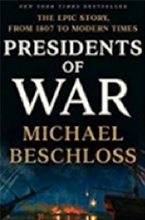
Presidential historian Michael Beschloss uses original letters, diaries, declassified documents, and interviews to bring us into the room and into the minds of a succession of American presidents – Monroe, Polk, Lincoln, McKinley, Wilson, Roosevelt, Truman and Johnson who led the nation into war. He says that the book was a daunting task, taking him many years and similar in terms of work and research to writing a new history or each man. Did they learn from or ignore the lessons of their predecessors? The answer is that each situation and each man was different, with some benefitting and some being broken by the experience. Beschloss is a first-rate historian and storyteller and this book is a fascinating description of the human foibles and leadership of our leaders in times of crisis.
No Better Friend, No Worse Enemy
By Jim Proser
December 31, 2018
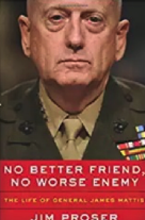
This is an almost-brand new biography of General James Mattis.- current up to six months ago or so. Taken from various news sources, speeches (including a 2011 speech to the Richland Rotary Club) the book covers primarily Mattis’ military career up until the time that he was chosen to be Secretary of Defense. There are excellent descriptions of the various campaigns and battles in Kuwait, Iraq, and Afghanistan that must have been taken from Marine Corps after batlle reports. The book is light on his childhood, formative years, and personal life. The book is a gold mine of references to books that Mattis has read and appreciated.Of particular interest to me is the fairly extensive information about how he familiarized himself with the Middle East, its politics, religions, and history. The title is taken from a Marine Corps motto, which he often used in the field. Excellent read. This will be particularly interesting to those who live in the Tri-Cities and are likely to encounter him when he returns home.
The Restless Wave: Good Times, Just Causes, Great Fights, and Other Appreciations.
By: John McCain and Mark Salter
December 31, 2018

You wouldn’t really think that there would be room for another biography about Douglas MacArthur, but Arthur Herman has written one, and it’s a finalist for the Pulitzer Prize. Herman is best known to me for his really outstanding history of the Royal Navy, To Rule the Waves:
How the British Navy Shaped the Modern World.
There are some new tidbits about MacArthur’s life, including that he kept a Philippine mistress in a New York hotel suite in the years before he met Jean. MacArthur’s persona and life view were shaped by his awe and respect for his father, General Arthur MacArthur, winner of the Congressional Medal of Honor in the Civil War.
Herman’s book is more well-rounded and balanced than many other MacArthur biographies. A good read, particularly about Asian policy.
Douglas MacArthur: American Warrior
By Arthur Herman
November 11, 2018
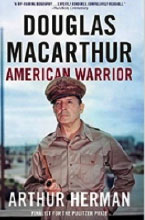
You wouldn’t really think that there would be room for another biography about Douglas MacArthur, but Arthur Herman has written one, and it’s a finalist for the Pulitzer Prize. Herman is best known to me for his really outstanding history of the Royal Navy, To Rule the Waves:
How the British Navy Shaped the Modern World.
There are some new tidbits about MacArthur’s life, including that he kept a Philippine mistress in a New York hotel suite in the years before he met Jean. MacArthur’s persona and life view were shaped by his awe and respect for his father, General Arthur MacArthur, winner of the Congressional Medal of Honor in the Civil War.
Herman’s book is more well-rounded and balanced than many other MacArthur biographies. A good read, particularly about Asian policy.
Horse Soldiers
By Doug Stanton
November 5, 2018

While I’m at it, let me recommend a 2009 NYT bestseller about the first CIA and Special Forces operatives into Afghanistan after 9/11. I can remember from the time some video shot of some ungainly large individuals wrapped in Afghan robes mounted on small Afghan ponies and the speculation about who they were. Now we know.
Leadership in Turbulent Times
By Doris Kearns Goodwin
November 5, 2018

I just finished reading Doris Kerns Goodwin’s latest book, Leadership in Troubled Times. Perfect read, if nostalgic, for the times we are in. Short vignettes at key stages in the lives of Lincoln TR, FDR, and LBJ that shows their very different forms of leadership. Excellent read.
The Face of Battle
By John Keegan
July 15, 2018
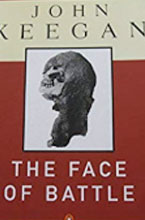
John Keegan was for years the Senior Lecturer at the Royal Military Academy at Sandhurst. He is the foremost military historian of my generation. The Face of Battle, written back in 1976, is a masterpiece. Ignoring the normal literary format of battle descriptions, he has produced a scrupulous recreation of three famous battles: Agincourt in October 1415, Watterloo in June 1815, and the Somme in July 1916. He vividly describes what the experience of combat meant to the participants. It has been called “one of the half-dozen best books on warfare to be written since the end of World War II.”
Friends Divided: John Adams and Thomas Jefferson
June 17, 2018
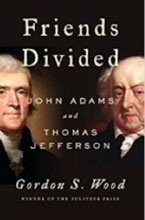
A TRULY REMARKABLE BOOK
Another thing to celebrate on the Father’s Day was finishing Gordon S. Wood’s truly remarkable book, Friends Divided, about the intertwined lives of John Adams and Thomas Jefferson.
Drawn largely on their extensive writings and correspondence, Wood compares the men, their different views on the American Revolution, the future of the nation, their estrangement and reconciliation, and their remarkable deaths on the same day the nation celebrated the fiftieth anniversary of the Declaration of Independence.
Separated by the rise of political parties leading up to the election of 1800 in which Jefferson defeated Adams, the two men (although they could not see it at the time) represented the two major themes that have characterize the politics of our nation. Jefferson’s based on the rights of man (but excusing slavery) and Adam’s based on strong central government.
Wood ends his book with this thought. “Since now the whole world id in the United States, nothing but Jefferson’s ideals can turn such an assortment of different individuals into “one people” that the Declaration says we are. To be an American is not to be someone, but to believe in something. And that something is what Jefferson declared. That’s why we honor Jefferson and not Adams.”
The Rise and Fall of the Great Powers
By Paul Kennedy
May 30, 2018
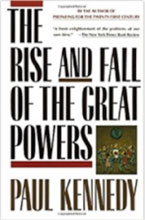
A BOOK WELL WORTH READING. . .A JIM MATTIS TOP 30 BOOK
Paul Kennedy is a history professor at Yale. In this book, he presents a pattern to explain the rise and fall of great powers. He studies and reports on economic and military factors that accompanied or caused previously dominant nations to lose their Great Power status. He divides the (1987) world into 5 principle actors: the US, the European Union (England, France, Germany only), the Soviet Union, China, and Japan. He discusses their economic and military strengths and weaknesses, and likely effects on their Great Power status. NOTE: This book was published in 1987, before the fall of the Soviet Union, before the fall of the Berlin Wall, and before China achieved its major economic transformation by adopting (somewhat) free-market policies. Thus, one might think that this book is well past its shelf life. However, what Kennedy undertakes to do is not to report on the world as it is in 1987, but to describe historical trends far predating 1987 and ending with the state of the would-be claimants to great power status as of 1987, and to show the role of interlocking factors of economic and military strength in trying to attain or preserve Great Power status.
Sea Power: The History and Geopolitics of the World’s Oceans
By Admiral James Stavridis
April 10, 2018
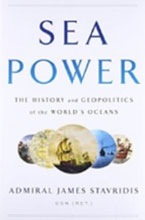 I haven’t had a chance to do much reading while I have been completing my Doc Hastings book. I want to recommend Admiral James Stravidis’ new book Sea Power. It is a primer of the nation’s oceans and seas and the geopolitics of each. We don’t pay enough attention to the role of sea power in our nation’s conflicts and this book provides a basic understanding.
I haven’t had a chance to do much reading while I have been completing my Doc Hastings book. I want to recommend Admiral James Stravidis’ new book Sea Power. It is a primer of the nation’s oceans and seas and the geopolitics of each. We don’t pay enough attention to the role of sea power in our nation’s conflicts and this book provides a basic understanding.
This is an excellent book for understanding the importance of the world’s maritime check points and their importance in history.
Grant
By Ron Chernow
March 9, 2018
 I just finished Ron Chernow’s 1,000+ page biography of Ulysses Grant. It is almost certainly the best book about Grant since Grant finished his memoirs just before his death in 1885.
I just finished Ron Chernow’s 1,000+ page biography of Ulysses Grant. It is almost certainly the best book about Grant since Grant finished his memoirs just before his death in 1885.
Chernow, who has published excellent biographies of Washington, Hamilton, and the House of Morgan, creates a detailed and balanced profile of Grant, detailing more than perhaps any other author his failed business dealings early and at the end of his life, his lifelong struggle with alcoholism, his commitment to emancipation and reconstruction, and his failures to reign in the corrupting abuses of those around him, particularly during his second term.
In addition, Chernow covers in great detail several lesser known aspects of the Grant story: his attempt to annex the Dominican Republic, and his interest in running for a third term. One are that is now adequately covered from my perspective is Grant’s efforts – through Sherman and Sheridan – to defeat the western Indian tribes and confine them to reservations, and the massive corruption of his Bureau of Indian Affairs.
Rather than the brutal general willing to needlessly sustain causalities, Chernow’s Grant comes away as caring, humane, and intelligent. Long, but a very good read. Should be read with Gran’s Personal Memoirs, probably the best military memoir ever written.
Alone
By Michael Korda
February 13, 2018
 I Just finished a really interesting book. “Alone: Britain Churchill and Dunkirk: Defeat into Victory” by Michael Korda. Korda wrote an excellent bio of T.E. Lawrence and several others, but this book is 2/3 history and 1/3 personal memoir.
I Just finished a really interesting book. “Alone: Britain Churchill and Dunkirk: Defeat into Victory” by Michael Korda. Korda wrote an excellent bio of T.E. Lawrence and several others, but this book is 2/3 history and 1/3 personal memoir.
Korda is the son of Michael Korda, the well-known London and Hollywood set director and nephew of Alexander Korda, the famous director who was married to Merle Oberon (sp). The Korda’s came to London from Hungary in 1919 when Adm. Horthy came to power after WWI. They were close to Churchill and the first-hand accounts are revealing.
Hero of the Empire
By Candice Millard
February 27, 2017
GREAT READ!
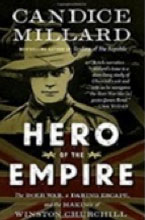 My holiday reading this year is a book my wife gave for Christmas last year and I am just getting to it. It is Hero of the Empire, the true story of Winston Churchill’s capture and escape from captivity during the Boar War. It”s another spellbinder history that reads like fiction by Candice Millard who wrote River of Doubt about Teddy Roosevelt’s near fatal exploration of a remote river in the Amazon.
My holiday reading this year is a book my wife gave for Christmas last year and I am just getting to it. It is Hero of the Empire, the true story of Winston Churchill’s capture and escape from captivity during the Boar War. It”s another spellbinder history that reads like fiction by Candice Millard who wrote River of Doubt about Teddy Roosevelt’s near fatal exploration of a remote river in the Amazon.
Rising Tide: The Great Mississippi Flood of 1927 and How it Changed America
By John M. Barry
December 19, 2017
THE BEST BOOK I’VE READ THIS YEAR!
 An American epic of science, politics, race, honor, high society, and the Mississippi River, Rising Tide tells the riveting and nearly forgotten story of the greatest natural disaster this country has ever known — the Mississippi flood of 1927. The river inundated the homes of nearly one million people, helped elect Huey Long governor and made Herbert Hoover president, drove hundreds of thousands of blacks north, and transformed American society and politics forever.
An American epic of science, politics, race, honor, high society, and the Mississippi River, Rising Tide tells the riveting and nearly forgotten story of the greatest natural disaster this country has ever known — the Mississippi flood of 1927. The river inundated the homes of nearly one million people, helped elect Huey Long governor and made Herbert Hoover president, drove hundreds of thousands of blacks north, and transformed American society and politics forever.
Winner of the Francis Parkman Prize for history; a New York Times Notable Book of the Year, winner of the Southern Book Critics Circle Award and the Lillian Smith Award.
The Gates of Europe
By Serhii Plokhi
December 3, 2017
AN EXCELLENT HISTORY OF UKRAINE
 When I worked in Birmingham, Alabama, we had a sister city, Krasnodon, located in eastern Ukraine, still the site of a hybrid civil war. I have just finished an excellent history of Ukraine from ancient times down to the the present.
When I worked in Birmingham, Alabama, we had a sister city, Krasnodon, located in eastern Ukraine, still the site of a hybrid civil war. I have just finished an excellent history of Ukraine from ancient times down to the the present.
Particularly interesting is Ukraine’s effort since 1991 to overcome the history of Russian empire and the Soviet Union to struggle to become truly independent. In my visits to Kiev and eastern Ukraine in the mid-1990’s I saw experienced first hand some of the early manifestations of that – struggles over language and degree of “Russianness” but also oligarchs taking over the economy, but I viewed the Orange Revolution and all that has transpired since from afar.
This book really helps to explain what is going on in Ukraine, and Russia. Recommended.
The Failover File
By Al Haggerty
October 30, 2017
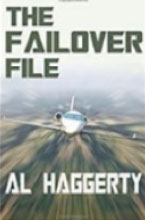 I just read Al Haggerty’s techno-thriller, The Flyover File. Not my normal read, but I couldn’t put it down. It held me on the edge of my chair until the final page. Highly recommended.
I just read Al Haggerty’s techno-thriller, The Flyover File. Not my normal read, but I couldn’t put it down. It held me on the edge of my chair until the final page. Highly recommended.
The Last of the President’s Men
By Bob Woodward
September 7, 2017
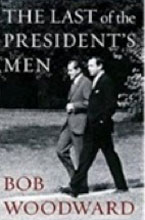 Some stories just have long legs. Some reporters live long enough to follow them. If you thought you knew all there was to know about Richard Nixon, think again. Bob Woodward’s new book “The Last of the President’s Men” about Alex Butterfield (who disclosed the White House taping system) is a really entertaining lead, disclosing never-before-know quirks about the president’s personality, his incredible shyness and insecurity, and long-held hate and rage.
Some stories just have long legs. Some reporters live long enough to follow them. If you thought you knew all there was to know about Richard Nixon, think again. Bob Woodward’s new book “The Last of the President’s Men” about Alex Butterfield (who disclosed the White House taping system) is a really entertaining lead, disclosing never-before-know quirks about the president’s personality, his incredible shyness and insecurity, and long-held hate and rage.
I was on the periphery of all that in those days. I met Nixon four times i think, but only once while he was in office. I was able to tour the Oval Office in his absence. As the regional director for the Economic Development Administration I was in the forefront of his strategy of providing grants to large cities with minority populations. Beyond thinking how politically stupid Watergate was, I felt that his actions destroyed all the good we were doing.
I remember meeting Butterfield’s father, Adm. Horace Butterfield at the the Tacoma Country Club. I remember meeting some of “the president’s men as a part of my work. Those experiences, and the war, began my multi-year process of changing parties. Sometimes today I yearn for the Republican Party of Nixon’s era.
Diplomacy
By Henry Kissinger
May 15, 2017
OUTSTANDING VIEW OF HISTORY AND DIPLOMACY
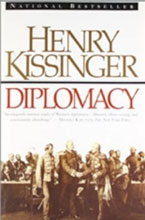 Kissinger’s review of international diplomacy is a deep and abiding analysis of what has happened in the western world since the 17th century and the beginnings of the European balance of power system. Kissinger works toward the modern world of international interactions (his book was published in 1994) and America’s role in forming and then surviving (so far) in this system.
Kissinger’s review of international diplomacy is a deep and abiding analysis of what has happened in the western world since the 17th century and the beginnings of the European balance of power system. Kissinger works toward the modern world of international interactions (his book was published in 1994) and America’s role in forming and then surviving (so far) in this system.
He explains the complex workings of the international order in fundamental terms. For example, discussing the problems at Versailles, “European style diplomacy presumes that national interests have a tendency to clash, and views diplomacy as the means for reconciling them. Wilson, on the other hand, considered international discord the result of ‘clouded thinking,’ not as an expression of a genuine clash of interests.” Knowing this fundamental difference in world views it is much easier to understand the difficulties at Versailles. This book is filled with this critical kind of information. It is also filled with the Kissinger style of thinking. First the overview, then an analysis of the detailed problem keeping the overview always in mind.
Reagan Rising: The Decisive Years 1976-1980
By Craig Shirley
September 8, 2017
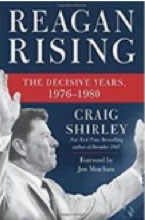 I just finished Craig Shirley’s latest book on the Age of Reagan as part of my research on my new book, Congressman Doc Hastings. Reagan influenced Doc to get involved in politics and Doc followed Reagan’s political philosophy to the end of his career.
I just finished Craig Shirley’s latest book on the Age of Reagan as part of my research on my new book, Congressman Doc Hastings. Reagan influenced Doc to get involved in politics and Doc followed Reagan’s political philosophy to the end of his career.
Shirley is a great storyteller and the book covers the period of time when Doc Hastings was cementing his political philosophy based largely on Reagan’s. Covers the years between his loss to Ford in 1976 and his victory over George HW Bush in 1980.
The World Remade: America in World War I
By G.J. Meyer
October 10, 2017
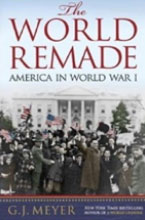 There has recently been a spate of new books about the run-up to the First World War. The World Remade by British author G. J. Meyer is one of the more interesting because it focuses on America. Interesting also because the basic narrative is interrupted by short vignettes about each of the principal participants.
There has recently been a spate of new books about the run-up to the First World War. The World Remade by British author G. J. Meyer is one of the more interesting because it focuses on America. Interesting also because the basic narrative is interrupted by short vignettes about each of the principal participants.
The Kill List
By Federick Forsyth
September 17, 2017
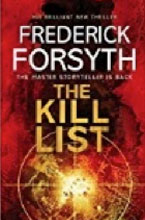 Just finished a great military thriller. Highly recommend Frederick Forsyth’s new book, “The Kill List.” I really enjoyed it.
Just finished a great military thriller. Highly recommend Frederick Forsyth’s new book, “The Kill List.” I really enjoyed it.
Britannia’s Navy on the West Coast of North America, 1812-1914
By Barry Gough
September 2, 2017
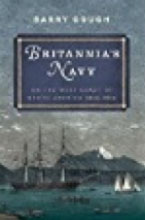 For all of my fellow Patrick O’Brien fans on facebook and others interested in the history of the Royal Navy. . . We correctly spend a lot of time following the Royal Navy in the Atlantic and the Med, but little has been written about the history of the RN in the northeast Pacific and the development of their naval base at Esquimalt, BC. On a recent trip to Victoria, I picked up this book and recommend it to all who might be interested.
For all of my fellow Patrick O’Brien fans on facebook and others interested in the history of the Royal Navy. . . We correctly spend a lot of time following the Royal Navy in the Atlantic and the Med, but little has been written about the history of the RN in the northeast Pacific and the development of their naval base at Esquimalt, BC. On a recent trip to Victoria, I picked up this book and recommend it to all who might be interested.
Derelictin of Duty
By H.R. McMaster
July 29, 2017
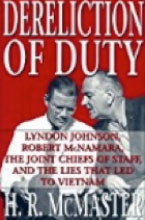 I’ve just finished H.R. McMaster’s excellent book on Viet Nam, Dereliction of Duty. I just hope he remembers all of those lessons he wrote about in his present job! (Note: He’s no longer there).
I’ve just finished H.R. McMaster’s excellent book on Viet Nam, Dereliction of Duty. I just hope he remembers all of those lessons he wrote about in his present job! (Note: He’s no longer there).
The Silk Roads: A New History of the World
By Peter Frankopan
April 21, 2017
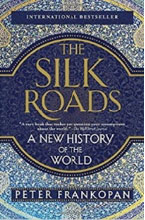
Far more than a history of the Silk Roads, this book is truly a revelatory new history of the world, promising to destabilize notions of where we come from and where we are headed next. From the Middle East and its political instability to China and its economic rise, the vast region stretching eastward from the Balkans across the steppe and South Asia has been thrust into the global spotlight in recent years. Frankopan teaches us that to understand what is at stake for the cities and nations built on these intricate trade routes, we must first understand their astounding pasts.
Frankopan realigns our understanding of the world, pointing us eastward. It was on the Silk Roads that East and West first encountered each other through trade and conquest, leading to the spread of ideas, cultures and religions. From the rise and fall of empires to the spread of Buddhism and the advent of Christianity and Islam, right up to the great wars of the twentieth century—this book shows how the fate of the West has always been inextricably linked to the East.
Istanbul: City of Majesty at the Crossroads of the World
By Thomas F. Madden
April 2, 2017

If you don’t have anything better to do than to immerse yourself in 2,000 years of the history of this great city, I can recommend this book. Learned a lot linked to the East.
The Peace to End All Peace: The Fall of the Ottoman Empire and the Creation of the Modern Middle East
By David Fromkin
January 20, 2017
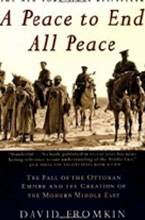 This book is a must-read for a basic understanding of the modern Middle East. It is one of my favorite reads. Five stars! It achieves an ideal of historical writing: its absorbing narrative not only recounts past events but offers a useful way to think about them….The book demands close attention and repays it. Much of the information here was not available until recent decades, and almost every page brings us news about a past that troubles the present.
This book is a must-read for a basic understanding of the modern Middle East. It is one of my favorite reads. Five stars! It achieves an ideal of historical writing: its absorbing narrative not only recounts past events but offers a useful way to think about them….The book demands close attention and repays it. Much of the information here was not available until recent decades, and almost every page brings us news about a past that troubles the present.
It is one of the first books to take an effective panoramic view of what was happening, not only in Egypt, Palestine, Turkey, and the Arab regions of Asia but also in Afghanistan and central Asia. The irony of the title will not be lost on the reader.
